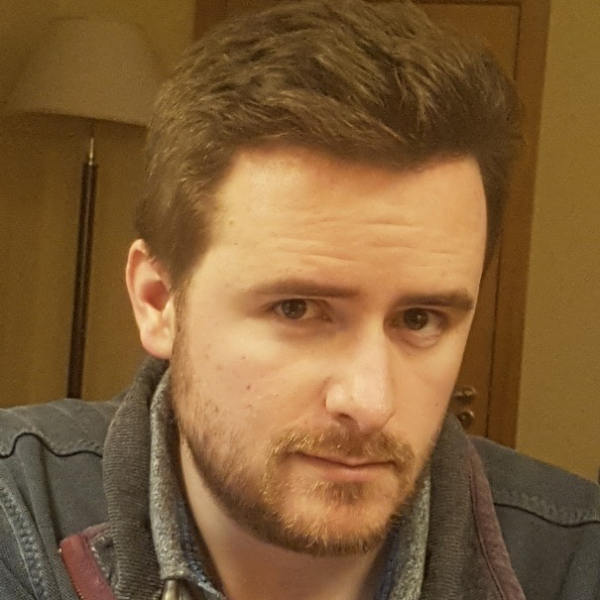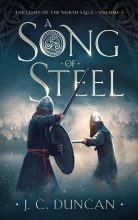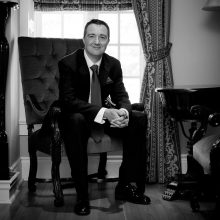A Song of Steel by J. C. Duncan
What led you into writing?
A mixture of fatalism and overconfidence? I have always wanted to write books. I have been a bookworm since I was about five years old, I had the reading age of an adult by age seven and just consumed books whenever I had access. It was all adventure fiction and war stories and some fantasy stuff. I always preferred books to TV. So ‘wanting’ to write was ingrained into me for a couple of decades. What led me into actually doing it? I guess I believed I was ready to tell my own stories, and I was bored with real jobs. I wanted something to do with my spare time that was creative and challenging. That was when I was naive enough to think you could be an author in your ‘spare time’. I think I was destined to be a writer; it was only a matter of time.
How does a typical day look?
I don’t have kids and I work from home, so as a married man no longer in the evening social scene at pubs etc. I have a lot of time on my hands, in theory. But on top of being an author I am an amateur bladesmith and have a workshop in my back garden. I am also an avid gamer and play various war and survival/crafting games with a little gaming group I’m a part of. So I almost never have nothing going on. I do my normal job in engineering management during the day, then I spent my early evenings writing, marketing or bladesmithing, typically only one of those per day. Then in the late evenings I read or game or chill with my wife in front of a film. On the weekends I like to do a project per day, I sometimes spend 6-8 hours in the workshop, making something sharp and shiny, although recently I’m more often twiddling with amazon marketing campaigns, or fussing over the edits on my next book. It is all incredibly hectic, and I don’t regret it at all. I can’t remember the last time I was genuinely bored or had nothing to do.
In what ways do your characters test your abilities?
The hardest thing about my characters is trying to avoid them all just thinking like me. When you are writing twenty people into a book, Its really hard to switch between, and remember, all their different world views, logic systems, and ways of thinking. If you don’t do that, you just get 20 people who do what you would do, which is frankly dull. So I tend to try and get into one at a time, go through the book looking at every scene they are in, and tweak it to make it more unique to them. that is REALLY hard to do well, and I catch myself getting it wrong all the time. Think of it as having to balance a split personality of 20 people, all without going completely insane. Maybe I am insane, how do you even tell? The voices say I’m ok, so they are probably right.
What’s your setup?
Very boring. I know some authors have this wonderful, almost fantastical author cave, full of wonderous objects of authoring and beautiful bookshelves. I just write at my work desk, which is covered in random work stuff. It looks like every desk you have ever seen, except it’s got a couple of knives strewn about it and on the wall behind me is a rack of deactivated guns, I’ll leave a photo of that, because it is far more interesting than my mess of a desk. Also, a perk of working from home, I have a whiskey cupboard in the office. Yes, I am that guy. I essentially have to have a tipple when I am deep in a writing session. Let me tell you that stopping to have a dram of good scotch while you are writing gets the creative juices flowing like nothing else. It is the peak of civilization.
What lasting effects have your favourite authors had on your writing and style?
The biggest effect any author has had on me, and I bang on about this because it is so important, is Christian Cameron’s attitude towards research. For most authors, research means reading up about something, which is often good enough. However, for Christian, and there are others who do this too, it is not enough to read about a thing, you must go and do the thing. So Christian writes about hoplite warfare in ancient Greece, but he also has a set of hoplite armour, and goes and does events and re-enactment in it. He has fought in his hoplite armour, he has sheltered an archer under his shield, he has marched across Platea in panoply. When he writes about marching twenty miles in full armour, you can tell he really knows about it, because he does. The detail and immersion this brings to his writing is impeccable. The same can be said for his fight scenes. One great weakness of war fiction authors, especially some historical fiction authors, is how dumb some of their fight scenes are. Some of the stuff that is written about fighting is so unrealistic that it puts me off a good story. You can forgive it in fantasy, because fantasy is different, but when I read in a historical fiction about a man sweeping a sword in an arc and cutting off three heads in one blow, or whatever, its just off putting. Christian is an accomplished and practicing martial artist with various weapons, spear, knife, particularly longsword. So when he writes fight scenes the realism is beyond reproach, and often he has done the very moves he is writing about. He also takes pains to visit the areas he is writing about. you cannot get a good appreciation of a place from maps or photos. He has often walked the battlefields he is writing about.
So, when I started writing a book about a swordsmith making pattern welded blades in the Norse style, I went out and hand forged a pattern welded Norse seax myself. When you read about the bladesmithing in my books, I have done most of it. I have researched the weapons and their use deeply, although I am not a martial artist, I study them deeply. I was also going to go on a road trip to visit the locations I wrote about, but COVID put an end to that. sadly. In future I will.
So, of all the many influences I have taken from many fabulous authors, that is the primary one. Do your research, and don’t just write about it, go and do it!
What do you do for inspiration?
Inspiration is a funny thing. If you go looking for it, you rarely find it. I find story ideas drop in my lap when I am doing other things. Sometimes literally in the shower, but more often when reading another book, or visiting a place, or watching a documentary on something that interests me. The story of the saga for my debut series, The Light of the North saga, fell into my head nearly fully formed when I read an article about a girl finding a Norse sword in a lake. I was like ‘I wonder what the story behind that sword is.’ And then I just decided I should write it. Within an hour I had in my head the outline for the whole story, and its ending. Inspiration is a fickle thing and cannot be forced to happen. If you want story ideas, go and read and travel and see new things and immerse yourself in the real history of this world. Something will come of that.
What repeating themes do you find yourself pulling into your stories?
The fact that good and evil are not usually real things, or absolute. That most conflicts do not have a good and bad side, that people are not heroes and villains. I hate stories with ‘goodies’ and ‘baddies’ and there isn’t a single flawless hero or utterly hateful villain in my entire series. Real people just aren’t like that. My protagonist is a lazy, ungrateful little **** a lot of the time. He doesn’t like responsibility, he isn’t as good as he thinks he is, he doesn’t empathise well with others, he takes what he has for granted and frankly, doesn’t care much about others. He doesn’t become a hero because he is a wonderful person, he becomes a hero because he overcomes his human shittiness to be better than he would otherwise have been, to give more of himself to others than he otherwise would have. The main antagonist isn’t an evil man, he is a product of his upbringing, the third son of a great noble who was bullied and abused and neglected and left to fend for himself, leaving him a bitter and twisted man who had a long list of grievances and an insatiable lust to right the wrongs done to him. But he is also a man who cares for his family, loves his friends, believes in a cause, looks after his men, and in his own way, believes he is on the side of right. Maybe he even is? Maybe you will decide he was right all along.
So that is the repeating theme, I don’t have stories of good and evil, I write stories of people, and people are both.
How do you wind down?
I play games with my friends, or chill and watch a movie with my wife, or sometimes I write new chapters of future stories. Yes, sometimes I write to get away from writing. Sue me.
What sort of challenges do you regularly overcome while designing your world/setting?
I work in alternative history, so for me I don’t have to worry too much about worldbuilding, I use the one we already have. The challenge is making sure my deviations make sense, and that my historical research is correct. Because I am referencing real events and people, I really have to make sure of the details and their biography and family etc. otherwise the whole thing can fall down. I also have to work within certain constraints of what happened before, and how the physics and reality of our world works. When you create your own world, that just isn’t nearly so much of a problem. you can make it how you like
What are you reading at the moment?
I am currently reading ‘The Last Berserker’ by Angus Donald… And the solar war series from the Black library… And ‘The trouble with peace’ by Joe Abercrombie…. My TBR pile is completely out of control.
What’s the most useful advice you could give to an aspiring author?
Make sure you are committed, and have a previous, stable income. Loads of people will tell you to just ‘be positive’, ‘Go for it’, ‘believe in yourself’, etc. and that all will be well if you just believe. This is survivors bias, because the only people you hear from are the successful ones. You don’t hear from the legions of failed authors. This is a tough, tough industry and the income is perilously low and the workload is hardcore. I am not trying to put you off writing, if you are going to be an author, literally nothing could put you off being creative and being creative is so important for us, for our mental health and our sense of purpose. but for god’s sake, get a job first and write your first manuscripts in the evenings. maybe 1 in 100 debut authors makes enough to live off in their first few years. That is the hard reality, the competition is massive, the market is overflowing with new work and new authors and the average income is crashing. If you can afford to so this for the love of it, and for a bit of extra cash if it goes well, go for it. If you are trying to make this your only career from scratch then you better be both lucky and exceptional. Sorry! Write your first few books while you have a job, take the pressure off your writing and let it blossom as a passion project, not under the negative cycle of time and money pressure, and THEN re-assess if it is a full-time career for you. You are more likely to be successful and happy that way.
Tell us about the book you’re promoting.
Ha! I forgot I was here to promote a book (marketing is not my strong point). My debut novel is ‘A Song Of Steel’, volume one in the Light of the North saga, a fictional saga about a mythical sword said to hold the fate of the Norse people in its core. The legend that has been passed down says that as long as the sword is wielded by a true Norseman, the people have a future. This series goes to the origins of that myth, and tells the story of how it was born, and the story of the legendary warrior smith who forged and wielded it during the darkest time of the Norse history.
The book is set in the early 12th century in an alternative timeline where the Norse had not converted to Christianity, and instead continued their ‘Viking’ ways. I have always thought the end of the Viking age was a bit of a letdown in narrative terms. The Norse nations were never defeated, they simply stopped being Vikings. So now you can read about a more exciting end, where the Christian nations raise a crusade to pacify the troublesome Northlands. The series goes into every level of this clash of civilizations, the politics, the cultural clash, the leaders, the people caught in the middle and of course, the campaigns and great battles that will decide who rules the North.
👋 Hi! I run Author Interviews
As a new writer I found myself itching to contribute to a thriving, creative community, so I made Author Interviews and I've met loads of wonderful people in the process. You can buy my debut fantasy RINGLANDER: THE PATH AND THE WAY from Amazon.





